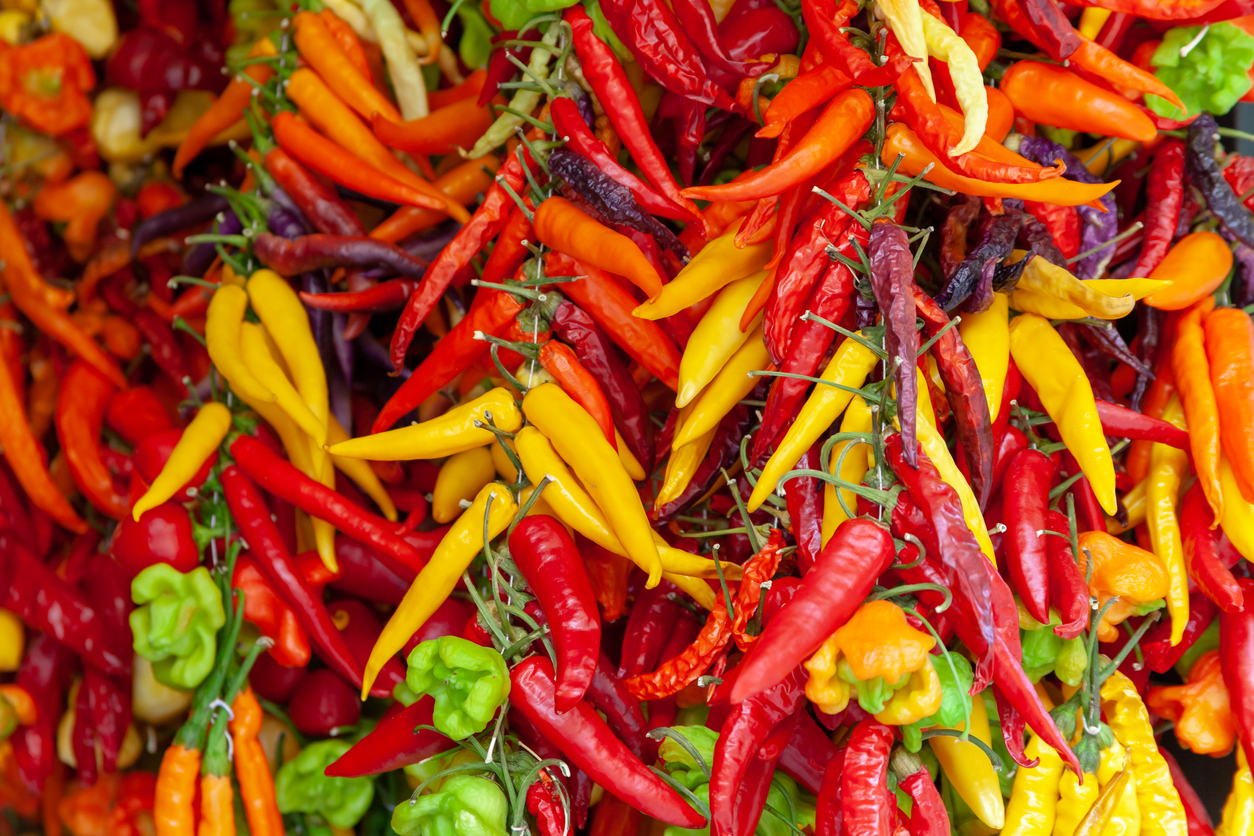If you’re not a fan of spicy food, you may want to consider turning up the heat a bit. Research has shown that chili peppers have antioxidant, anti-inflammatory, and blood sugar-regulating properties, and may even add years to your life. Keep reading to learn all about the health benefits of peppers, and why you may want to add a little more spice to your plate every so often.
Why Are Chili Peppers So Healthy?
Chili peppers (Capsicum annuum) are the products of Capsicum pepper plants, known for their spicy flavor. They’re also in the nightshade family, with bell peppers and tomatoes. While they’re primarily used as a spice (cooked, dried, and powdered), so they’re very easily attainable.
Chili peppers are rich in the following vitamins and minerals:
- Vitamin A. Red chili peppers are high in beta carotene, which your body converts into vitamin A.
- Vitamin B6. Get ready for an energy boost!
- Vitamin C. Peppers are rich in this powerful antioxidant, which is important for immune function and wound healing.
- Vitamin K1. K1, or phylloquinone, is essential for blood clotting and healthy bones and kidneys.
- Potassium. This essential dietary mineral serves a variety of functions and may reduce your risk of heart disease when consumed in adequate amounts.
- Copper. Copper is an essential trace element for healthy neurons and strong bones.
The health benefits of peppers are also because of capsaicin. This bioactive plant compound in the chili peppers are responsible for their unique taste and offer many health benefits.
The Health Benefits Of Chili Peppers
There are multiple health benefits of chili pepper, ranging from fighting fungal infections to improving cognitive functions. There’s also research out there to suggest that eating chili peppers can improve longevity and red blood cell growth.
They can help with migraines.
Spraying hot pepper juices up your nose may not sound like the best idea in the world, but it may stop your migraine pain. That’s because capsaicin has the ability to numb your brain’s trigeminal nerve, where some migraines start. In fact, seven out of 10 people in a study who had cluster, tension, and other headaches had total relief! That may just make the sharp tingle worth it.
They can extend your life.
Eating peppers may just mean a longer life! A study determined that adults who consumed at least one fresh or dried hot chili pepper once a month for 20 years lowered their chance of death by 13%. The jury is still out as to why, but it could just be the nutritional value and their inflammation-fighting powers.

They can clear sinuses.
If you’ve ever eaten spicy foods, you may have experienced clearer sinuses as a result. You can thank capsaicin for that! Sure, you may be suffering from the heat at first, but once this plant compound kicks in, you could enjoy stuffy-free sinuses for up to a few months.
Chili peppers speed metabolism.
When you consume hot peppers and experience that total-body flush, that’s the capsaicin firing up! The chemical actually activates a sensory neuron called TRPV1, which helps keep fat from building up and controls your appetite. And even better: this metabolism-quickening combo may just help you lose weight. Researchers are currently attempting to apply this knowledge to curb weight gain.
Peppers soothe arthritis.
Capsaicin is actually a super ingredient in many lotions, creams, and patches to heat up the area and reduce pain. In fact, in one study, it cut discomfort from fibromyalgia and arthritis in half in just a few weeks.
They can battle cancer.
Research has shown that capsaicin may kill cells linked to more than 40 types of cancer, including the colon, lung, liver, and pancreatic cancers and leukemia. It turns out that this spicy chemical can change how some genes linked with cancer cells act and may even stop them from growing.
Does it matter what kinds of peppers you eat?
All peppers will contain capsaicin, so it doesn’t really matter what peppers you decide to consume. There are a ton of hot peppers out there, including Anaheim, cayenne, habanero, jalapeno, bell peppers. However, to avoid heartburn and discomfort, you may want to find something mild. And if you see a dark name like Reaper, Ghost, or Scorpion, you may want to stay away.
How do you know which peppers are the hottest?
Peppers are rated by the Scoville heat scale. This rates the capsaicin levels based on how much sugar water it will take to neutralize the heat. It ranges from zero to 1,641,183 Scoville heat units (SHU). The hottest pepper in the world? The Carolina Reaper at 1,641,183 Scoville heat units (SHU).
When shopping for peppers, keep in mind that dried peppers will be hotter than fresh ones. And the thinner the stem, the hotter the pepper.
The Downsides Of Regularly Consuming Peppers
Chili peppers are relatively harmless, but they can have their downsides if you have a low tolerance for heat and/or you experience heartburn:
- Burning Sensation: Some people won’t eat peppers because it’s uncomfortable. That’s also due to capsaicin. It binds to pain receptors and causes an intense burning sensation.
- Stomach Pain and Diarrhea: Eating chili can cause intestinal distress in some people, like abdominal pain and burning sensations.
- Problems With Irritable Bowel Syndrome (IBS): Chili peppers can worsen symptoms of IBS, so it may be wise to limit consumption.
If you experience any of these symptoms, it may be best to curb the peppers for a while or try something mild.
Ways To Incorporate Chili Peppers Into Your Diet
if you love spicy food, eat up! If you’re not a fan of heat, try adding small amounts to soups, pasta, salads, and even chili. Here are some foods and recipes that you can try:
- Kimchi: This Korean side dish packs on the heat with red chili peppers and capsaicin.
- Black Bean Chili Soup: Perfect for this cooler weather, add just a kick of spice to this hearty recipe to maximize the benefits.
- Watermelon Salad With Jalapeno and Lime: This cool and delicious side dish is a great way to balance out the sweetness and spice.
The Takeaway
Chili peppers carry a multitude of health benefits, but researchers are still unclear why they’re linked to lower mortality rates. The jury is also still out as to how many peppers need to be consumed to take advantage of these health benefits.
Related Article: Inflammation is part of our body’s immune response. We need it to fight infection and heal injuries but when it becomes chronic, research suggests it can damage our arteries, tissues, joints and organs leading to many of the health issues that plague women over 50 such as heart disease. Read more about the best (and worst) foods for inflammation.







